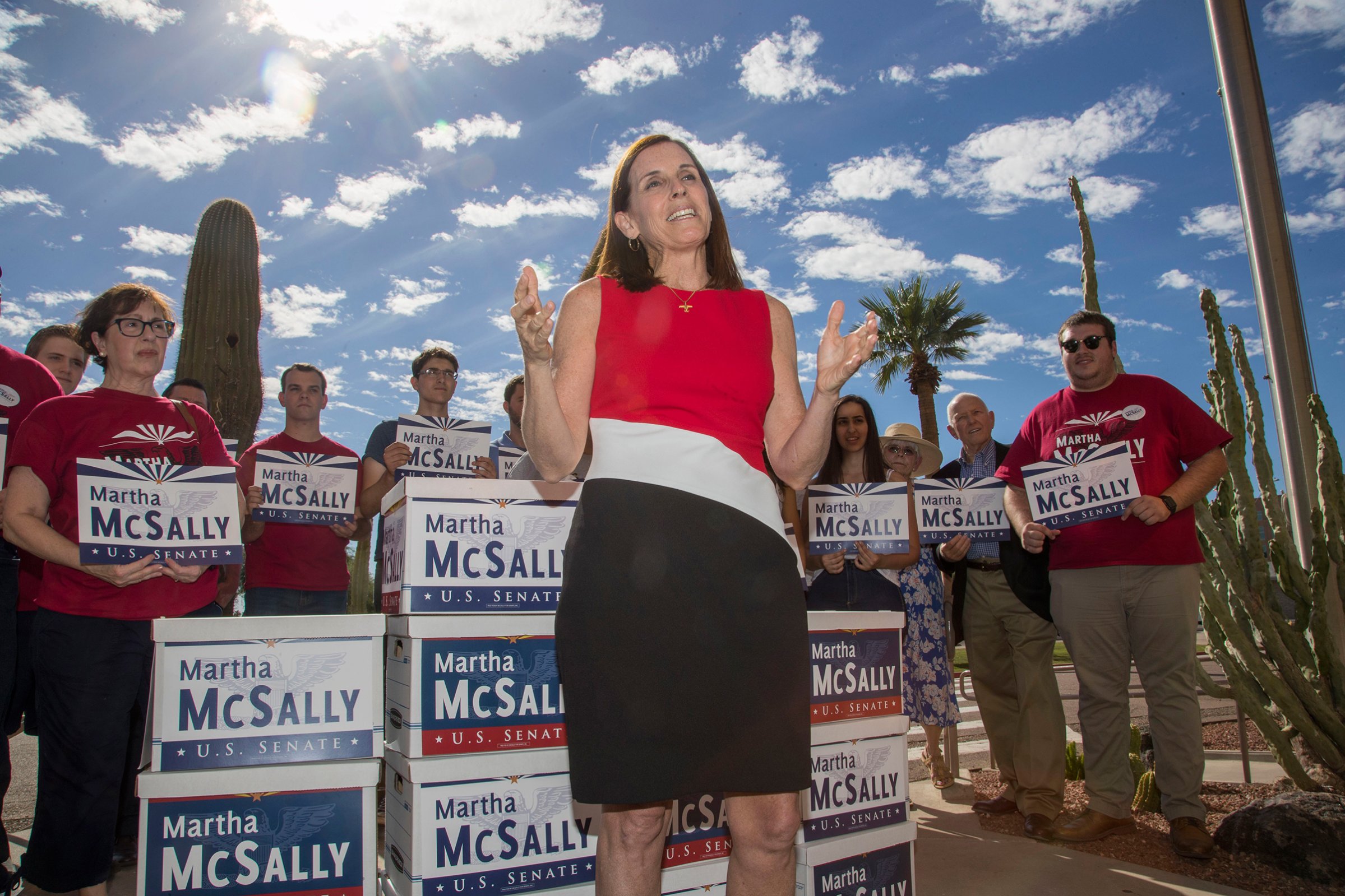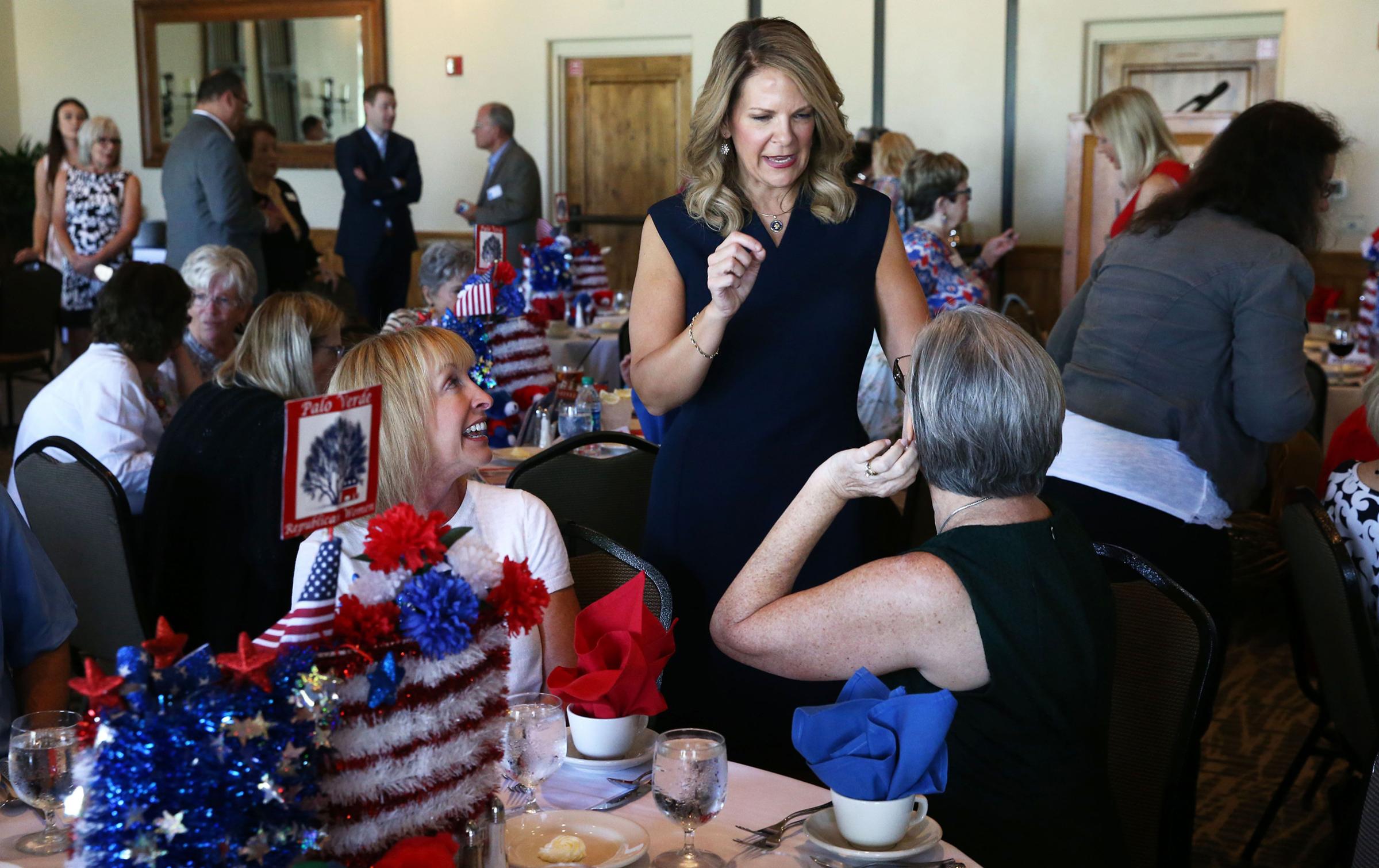
Jaclynn Greer’s Service Station North of Phoenix is booming. And the local economy is so strong that she was able to launch a second small business. She credits it all to President Donald Trump. That’s why Greer has shed her political identity as an independent and shown up on this scorching August evening at a Republican Women of Black Canyon City event, where GOP Senate hopeful Kelli Ward is milling about with 70 or so activists in a Masonic temple. “He’s doing everything he said he’d do,” Greer says of the President. “We need more people like Kelli to have Trump’s back.”
In terms of approval ratings, Trump’s national numbers trail each of his four most recent predecessors at this point in their terms. But he remains overwhelmingly popular among GOP voters, ranging between 80% and 90%, according to Gallup. Which means that if you’re a Republican running in a conservative state, the President’s political clout can mean everything. Nowhere is this more apparent than in Arizona’s Senate Republican primary, where former state senator Ward, Representative Martha McSally and retired sheriff Joe Arpaio are competing to cast themselves as Trump’s preferred candidate on the Aug. 28 ballot.
This was not what national Republicans had in mind when they recruited McSally to run. They saw the two-term Congresswoman–a retired Air Force colonel who was the first female pilot in U.S. history to fly a combat mission–as the kind of pragmatic legislator who could attract Democratic votes in a state trending purple. She was widely expected to coast past Ward, who is seen as a hard-right candidate and who lost in a 2016 Senate bid, and Arpaio, who was convicted of criminal contempt in ’17 when a federal judge found that he had ignored a court order to end racial profiling at his jail. (Arpaio, an outspoken Trump supporter, was pardoned by the President one month later.)
It wasn’t just McSally’s strong résumé that led establishment Republicans like Senate majority leader Mitch McConnell to regard her as the party’s top recruit in the midterms. It was also her previous criticism of Trump. McSally skipped the 2016 GOP convention and called Trump “unacceptable” and “disgusting” after a video tape emerged of him bragging about sexual assault. She went on to win her district by 14 points the same day Hillary Clinton carried it by 5. In a sense, McSally embodied the fading Republican hope that Trump would not consume the party, and that lawmakers could speak out against the President without paying a price at the polls.
Instead, she may become a cautionary tale. McSally’s lead has softened as right-wing voters have appeared to flee from Arpaio and consolidate around Ward. Seeing her advantage slide, McSally has both lowered her campaign profile and doubled-down on her awkward embrace of Trump. Worried national Republicans are dumping millions of dollars into the state to save McSally’s struggling campaign, knowing her defeat would damage their chances of holding the seat–and the Senate–in November, when moderation can be a good thing.
What the race has already proved is that it may be impossible to stand up to Trump in any meaningful way and remain in good standing with the GOP. “He has a lot of diehard fans,” says Bob Branch, a candidate for state superintendent who is wearing a button that reads, TRUMP SUPPORTERS ELECT DR. BOB BRANCH. “You can try to run without supporting him, but you’re not going to do well.”
It was never going to be easy for McSally to run against two more-conservative opponents. Already this year, Republicans have watched Representative Luke Messer, chairman of the Republican Policy Committee, lose an Indiana Senate primary to businessman Mike Braun, a Trump-styled outsider. In Minnesota, former two-term governor Tim Pawlenty came up short on Aug. 14 in his bid to return to the role, losing to a less well-known candidate who embraced the President. “The Republican Party has shifted,” Pawlenty said upon losing. “It is the era of Trump, and I’m just not a Trump-like politician.”
Arizona is a complicated place to run as a moderate Republican. The state GOP is among the most conservative ones in the country, going so far as to censure John McCain in 2014 for working on a bipartisan immigration bill. McCain had beat back a primary challenge from a Congressman turned talk-radio host in 2010 by lurching rightward, then survived six years later–when Ward challenged him and won 39% of the primary vote–by spending $6 million to stave her off. Almost immediately after that race, Ward gunned for Jeff Flake, one of the few Republicans in the Senate to regularly criticize the President. Sure enough, Flake suffered for his temerity. He looked at his poll numbers and deduced that the only way to win was to bear-hug Trump. He decided to retire instead.

So McSally chose to reinvent herself as a Trump acolyte. She withdrew her sponsorship of legislation to protect children brought to the U.S. illegally from deportation and removed video clips from her YouTube account defending these so-called Dreamers. Her announcement video included an edited clip of Trump praising her from the Rose Garden. She hit the trail with former governor Jan Brewer, a prominent Trump backer. McSally’s supporters flooded social media with photographs of her in the Cabinet Room, two seats away from Trump as he talked about immigration. Her surrogates bragged about McSally’s invitations to movie nights at 1600 Pennsylvania Ave.
In some ways, the makeover is working. At least seven times, Trump has name-checked McSally at official events. The latest came on Aug. 13, when Trump saluted her as he signed a military spending bill at Fort Drum in upstate New York. “I’ve gotten to know her very well, and she is terrific,” the President said, noting her combat flight experience.
But in other ways, McSally gives the appearance of a candidate trying to run out the clock. She has refused debate invitations, including one from Fox News, and isn’t above kicking reporters out of an event. During the four days I was on the ground in Arizona, not once would her staff disclose where she was making public appearances, despite repeated requests. When told when I was leaving, the campaign finally offered me a chance to attend an event a few hours after that.
Meanwhile, Ward underwent her own reboot. In 2016, she openly questioned whether McCain would live to serve all of a new six-year term. The rough edges that made national Republicans skittish have been sanded down. “She’s cleaned up her act,” says Francine Romesburg, who leads the Grassroots Tea Party Activists of Arizona and considers Ward a friend.
Ward says she is even open to supporting McConnell staying on as majority leader if election night in November goes well for both of them. “I’ve heard people say, ‘You’re a different candidate than you were two years ago.’ Well, if I weren’t, then I shouldn’t be here running for this office,” Ward tells TIME at her campaign headquarters in a Tempe office park, where a cardboard cutout of Trump welcomes visitors at the front door and another leans against a wall in the conference room. The Ward campaign is in overdrive, with 27,000 doors knocked on and 240,000 calls to voters so far. (The McSally team says it is at the 500,000-call mark.) A super PAC backed by wealthy donors Robert and Rebekah Mercer dug deep in its pockets for ads to rebrand Ward and ding McSally. While she’s deeply conservative, Ward is not the caricature that McCain and allies previously painted, when they incorrectly said she had used tax dollars as a state senator to investigate whether the government is adding mind-control chemicals to the air via Chemtrails, or the condensation trails that follow planes. “I don’t want to be a political bomb thrower,” she says now.
The few public polls that exist have shown McSally running comfortably ahead, but observers on both sides say the race is narrowing. The National Republican Senatorial Committee is trying to coax Trump into endorsing McSally, Republican officials say. The logic is that a right-winger will have a harder time winning over independents in the general election. And if Arizona goes blue, there’s a good chance that McConnell will have to yield the gavel to Democratic Senator Chuck Schumer. But Trump has resisted. Some Arizona Republicans suspect he is holding out hope for Arpaio, an early backer.
The cantankerous retired sheriff had been Ward’s biggest challenge and McSally’s best hope. Arpaio still has mythic standing among immigration hard-liners, and for months he and Ward had split their vote. But on Aug. 5, comedian Sacha Baron Cohen aired an interview with Arpaio in which he had duped the sheriff into saying he would engage in sexual acts with Trump if asked. The incident did little to help a campaign that spent little time pursuing votes. But as Arpaio faded, McSally suffered too. She had been faring fine in a three-way race, but a head-to-head with Ward looks trickier. Meanwhile, crafty Democrats are paying for ads attacking McSally and implicitly promoting Ward, since they see her as an easier opponent in November.
No matter who emerges as Arizona’s next Senator, the winner in all this may be Trump. The primary suggests that it’s all but impossible to survive as a Republican without embracing him. Even the presumptive Democratic nominee, three-term Representative Kyrsten Sinema, is taking pains not to alienate Trump. Sinema, the first openly bisexual member of Congress, is a former Ralph Nader staffer who has proved to be a skilled fundraiser. But she recognizes the balancing act required to win in Arizona, and she has voted with Trump about 60% of the time, including to roll back some banking regulations and to allow veterans to seek treatment outside the VA. That has sparked some grumbling among her base: in May, the Pima County Democratic Party considered a motion of condemnation against Sinema, only to be talked out of it because it could help the Republican nominee.
These days Ward is betting she has the inside track. On a recent night at a Denny’s in Phoenix, she stood for hours talking with activists as the thermostat on the wall clocked 94°F. A demand that Trump’s proposed wall run full-length earned huge applause. Ward called herself “an America-first champion that will go to Washington, D.C., and get to work, working on an America-first agenda to make America great again and keep America great in 2018, 2020 and beyond.” She kept talking, fully aware, along with everyone else in the Republican Party, that in a primary, no candidate dares to rise to challenge those words.
More Must-Reads From TIME
- The 100 Most Influential People of 2024
- The Revolution of Yulia Navalnaya
- 6 Compliments That Land Every Time
- What's the Deal With the Bitcoin Halving?
- If You're Dating Right Now , You're Brave: Column
- The AI That Could Heal a Divided Internet
- Fallout Is a Brilliant Model for the Future of Video Game Adaptations
- Want Weekly Recs on What to Watch, Read, and More? Sign Up for Worth Your Time
Write to Philip Elliott / Black Canyon City, Ariz. at philip.elliott@time.com